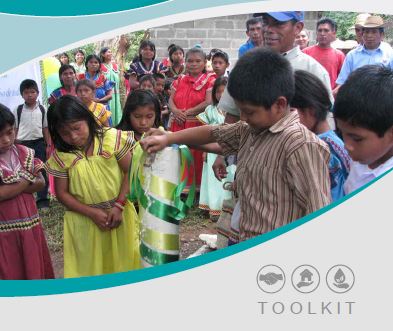WATER AND SANITATION SERVICES, ACHIEVING SUSTAINABLE OUTCOMES WITH indigenous people in Latin America and the Caribbean
The objective of this Toolkit is to provide practical guidance and operational tools to promote the inclusive delivery of sustainable Water Supply and Sanitation (WSS) services to Indigenous peoples in Latin America and the Caribbean (LAC). The World Bank estimates that 43 percent of the approximately 42 million Indigenous peoples in LAC live in poverty and that 24 percent live in extreme poverty.1 These poverty rates are more than twice the levels found among the non-indigenous population. While the number of Indigenous peoples living in poverty has fallen over recent years, the poverty gap between Indigenous and non-indigenous Latin Americans has stagnated or, in the worst cases, widened. In LAC, Indigenous peoples are 10 to 25 percent less likely to have access to piped water and 26 percent less likely to have access to improved sanitation than the region’s non-indigenous population.2 Lack of access to WSS services perpetuates chronic poverty by contributing to poor health, infectious skin and gastrointestinal diseases, and malnutrition, among other ailments. Extending the human right3 of access to WSS services to Indigenous peoples represents the final step for many LAC countries to reach universal water coverage. To effectively and permanently close this coverage gap, LAC countries need to extend WSS services sustainably and inclusively to Indigenous communities. Local service providers in Indigenous communities have historically been more likely to “slip” into failed service provision than in nonindigenous communities.4 The field work carried out for this Toolkit indicated that adoption5 and use of WSS systems is lower and slower in Indigenous communities6 largely because of investors’ and service providers’ lack of knowledge and limited attention to Indigenous peoples’ unique social and cultural characteristics. Oftentimes, Indigenous communities are avoided by WSS project planners and proponents due to their lack of understanding of how to carry out projects in collective or semiautonomous Indigenous territories, the remoteness of these areas, and the high associated per capita cost of a potential operation, among other reasons. In general, the WSS sector has lacked a participatory framework tailored to Indigenous peoples with specific principles to guide stakeholder engagement processes, participatory strategies, and the selection and implementation of investments to promote sustainable outcomes for WSS projects with Indigenous peoples. The preparation of this Toolkit recognizes the need for further analysis and work beyond the traditional approaches to work in rural areas, to be able to deliver suitable results for and with Indigenous peoples This Toolkit draws on the findings of interviews, consultations, and field visits carried out in 37 Indigenous communities7 in seven Latin American countries (Panama, Nicaragua, Paraguay, Argentina, Peru, Colombia and Bolivia) where the World Bank or other development actors have implemented WSS projects. A multi-disciplinary World Bank team, which included WSS engineers, anthropologists, social specialists and economists, among others, carried out the fieldwork. Through interviews with all the stakeholders (governments, WSS institutions including their decentralized units, Indigenous organizations, NGOs, other development agencies and beneficiaries) involved in the rollout of these projects, this on-the-ground work was able to synthesize lessons learned from a range of perspectives from actual interventions. The lessons from the field presented in this Toolkit were also informed by a desk review, interviews with WSS, NGOs and Indigenous experts and representatives outside of the countries chosen for the field visits. As opposed to other low-income groups, Indigenous peoples often: (i) subscribe to organizational and governance structures that are different from the rest of society; (ii) maintain extensive traditional knowledge around their land, natural resource base, and environment; (iii) utilize unique practices and cultural norms around water collection, storage, distribution, sanitation and hygiene; and (iv) hold strong beliefs and practices around the well-being of the collective versus the individual, leading to a higher degree of social cohesion, unique traditions and structures of community organization, and different norms around communal contributions. The recommendations in this Toolkit specify how to take these characteristics into account in the delivery of WSS services to Indigenous peoples while combining them with established good practices for good quality and sustainable WSS service delivery to low-income groups, particularly in rural areas. These good practices for sustainable service delivery in the WSS sector (such as the demand-responsive approach, participatory approaches, trainings and communication with users, water committees establishment, sanitation behavior change, etc.) are emphasized throughout the document as field work demonstrated that these elements, together with other provisions for governance and socio-cultural tailoring, are critical for successful interventions with Indigenous peoples.
